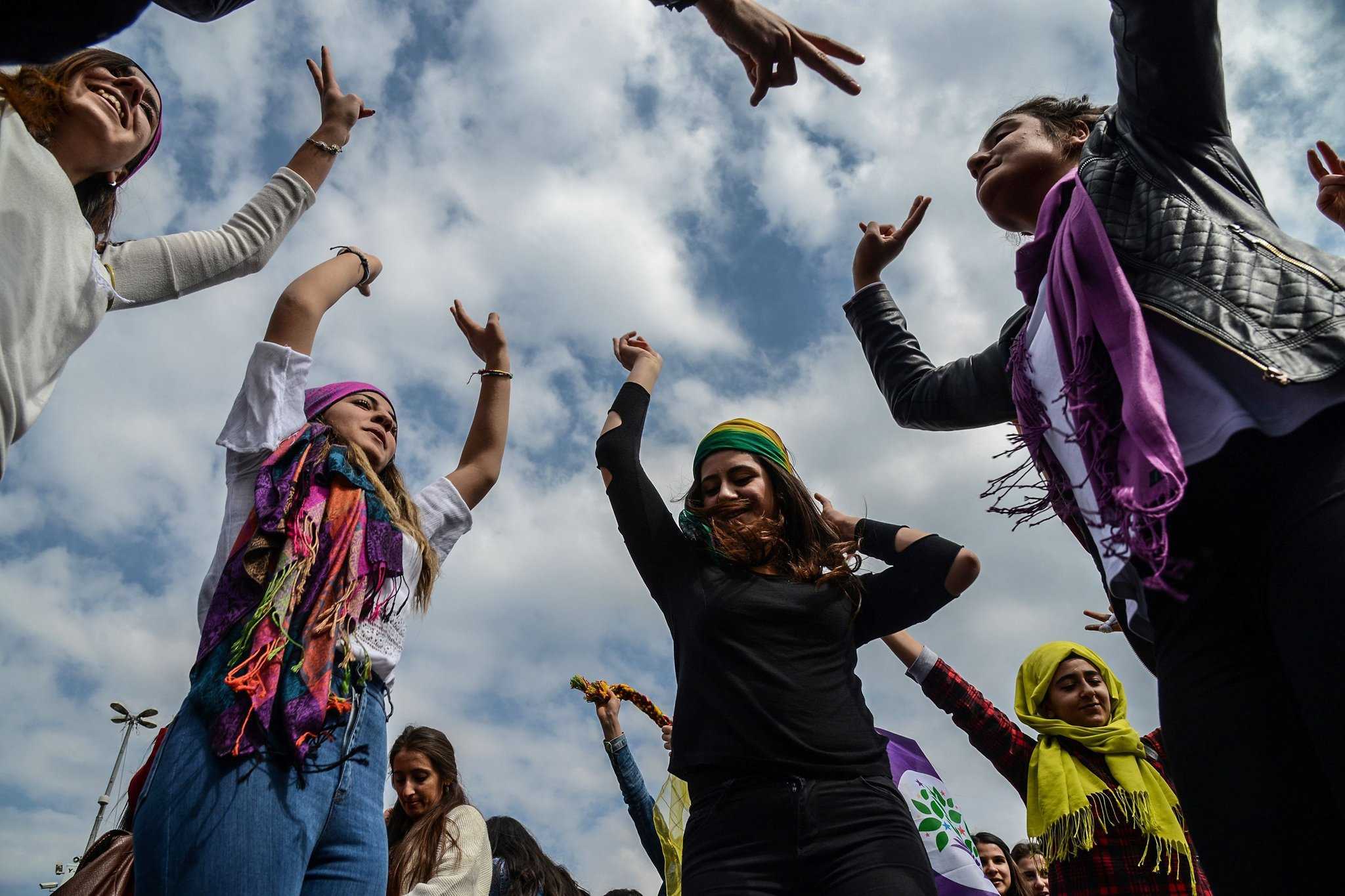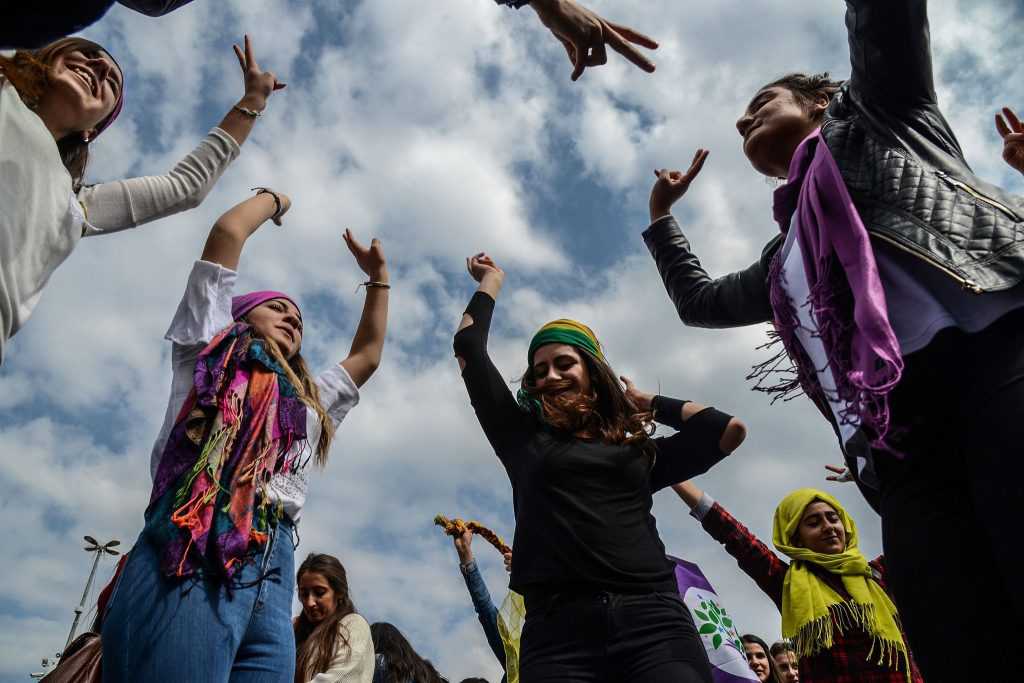
Others commemorated the day on Twitter:
Happy #InternationalWomensDay
or, as it’s often called on here, #WhyIsn‘tThereAnInternationalMensDay
(There is: November 19th)— J.K. Rowling (@jk_rowling) March 8, 2017
Happy #InternationalWomensDaypic.twitter.com/sncvQpGNYt
— Bana Alabed (@AlabedBana) March 8, 2017
Today, we celebrate women and are reminded of our collective voice and the powerful impact we have on our societies and economies. #IWD2017
— Ivanka Trump (@IvankaTrump) March 8, 2017
Iceland’s government announced plans to eradicate gender pay disparities by 2022. Four Russian feminist activists unfurled a giant poster outside the Kremlin in Moscow, denouncing the patriarchy (they were arrested). India’s prime minister honored a symbol of rural women’s aspirations for dignity and self-sufficiency — the toilet. The Egyptian authorities said they would allow female prisoners an extra family visit this month.
The events were all centered on International Women’s Day on Wednesday, and people and governments across the globe observed it in an outpouring of support for women’s equality and empowerment. But amid the celebrations, protests were brewing.

Demonstrations were scheduled for Wednesday afternoon in dozens of cities across France. In Paris, protesters planned to march from the Place de la République to the Opéra Garnier.
Unions, student organizations and feminist associations were calling for women to start striking at 3:40 p.m. — symbolically the time of day when Frenchwomen stop being paid, they argue, because of an average 26 percent pay gap with men.
With the coming presidential election, the protest organizers unveiled a list of 20 demands, including salary increases, less temporary work and better enforcement of penalties for companies that discriminate against women, including when they are pregnant.

In Buenos Aires, small groups of women began taking to the street at noon in preparation for a march later in the afternoon. Tens of thousands of people were expected to attend.
Erika Monteiro, 30, a public-sector employee, decided to join a protest of about two dozen women outside congress during her hourlong lunch break. “They are killing us,” Ms. Monteiro said, referring to the chilling statistic that a woman is killed in Argentina every 30 hours because of her gender. “We can’t get used to that as if it were normal.”

The call for women to leave their workplace and make noise (called “ruidazo”) was the warm-up to the fourth women’s march across the country since June 2015, when tens of thousands gathered under one banner, Ni Una Menos (Not One Less), after a horrific wave of killings. In October, the brutal rape and murder of a 16-year-old led to the first women’s strike in the country.
Laura De Marinis, a 30-year-old lawyer, clapped and blocked a road alongside other protesters. “I left my kid at home with my husband,” she said, emphasizing one of the key points of the demonstration: Domestic work continues to fall disproportionately on women.
Many of those present said they had witnessed a change in attitudes. “Women are starting to stand up for themselves more, and we are realizing that we don’t have to put up with a culture that oppresses us just for being women,” said Lucía D’Agostino, 48, a psychologist.
In Tbilisi, Georgia, women demonstrated under a symbolic “glass ceiling” to illustrate limitations on women’s empowerment.

Thousands marched in Rome on Wednesday evening, in what was the largest of dozens of demonstrations in various Italian cities. Wearing pink boas, waving placards with figures of matryoshka dolls in various guises and chanting slogans from the 1970s, women of all ages, as well as some men, took to the streets to protest discrimination, wage inequality and violence against women.
“There are so many young women, it’s transgenerational. That’s bellissimo,” said Maria Brighi of Rome’s International House of Women, and one of the organizers of the march.

Organizers said that some 20,000 people had participated in the protests, which started from the Colosseum and wove through parts of downtown Rome, blocking traffic and shutting down public transportation.
To mark the deaths of women killed by ex-husbands and former partners, flags were flown at half-staff in front of Italy’s lower house, Montecitorio.
In Russia, where International Women’s Day is a Communist-era holdover that is sometimes called St. Valentine’s Day, President Vladimir V. Putin lauded women, saying:
“Even today, on International Women’s Day, you are still caught up in your routine, working tirelessly, always on time. We often ask ourselves: How do they manage it all?”
An all-female airline crew from Brazil took to the skies to mark the occasion, days after Air India said it become the first airline to fly around the world with an all-female crew.

About 700 women’s rights advocates rallied in a conference hall in Seoul, South Korea, calling for an end to gender discrimination and the loosening of abortion restrictions. Demonstrators carried signs reading, “3 O’Clock, Stop,” a reference to the gender pay gap. Women are compensated so much less than men that they are essentially working free after 3 p.m.

In Yogyakarta, Indonesia, women danced during a celebration.

In Colombo, Sri Lanka, traditional dancers performed.

Outside a Roman Catholic church in Manila, women wore masks smudged with fake blood to call for an end to violence against women. At a rally near the United States Embassy, female police officers holding shields stood guard as a women’s group, Gabriela, held a rally.

The president of the Philippines, Rodrigo Duterte, who has made inflammatory remarks about sexual assault, gave a speech praising women — though he also lashed out at the country’s highest-ranking female elected official, Vice President Leni Robredo, and at a political rival, Senator Leila de Lima.
Another senator, Risa Hontiveros, accused Mr. Duterte of allowing a “pervasive culture of sexism, misogyny and gender bias.”
One of the most unusual events occurred in India, where Prime Minister Narendra Modi presided over a ceremony in honor of 10 “clean warriors,” all women who had campaigned to improve rural sanitation. They included Sushila Khurkute, 30, who recently gained prominence when, seven months into her third pregnancy, she spent three solitary days chipping away at the rocky ground with a stick to make her family a toilet.
A group of Unicef volunteers touring the area began documenting her efforts and her story. The toilet, she told them, was crucial to the welfare of her child. Because women defecating in open fields are vulnerable to sexual assault, she said, she had starved herself during her two previous pregnancies, weakening her babies.

The images rippled across India, where around 300 million women still defecate in the open.
As Ms. Khurkute’s story was widely shared online, news outlets joined the discussion, nominating women like Kajal Roy, who mortgaged her jewelry and used the money to build 100 toilets, and Kunwar Bai, whose age was reported as 105 and who had sold two goats to build herself a toilet, despite never having used one. In a constellation of villages in the northern part of the country, elders recently voted to impose a new regulation — no daughters would be given away in marriage to a household that did not have a toilet.
In Guinea-Bissau, the United Nations sponsored a bicycle race and ceremony as part of a workshop on women in the workplace. Far fewer than half of all workers in the nation are women. Many work in the informal economy, with low pay and no social protection.

The U.N. also teamed up with the African Union to release a report on women’s rights. It showed the strides women had made, such as participation in various legislative bodies, but also highlighted the strides other countries have made. Several nations have passed measures against gender-based discrimination and gender-based violence, according to the report.
In six African countries, however, legal protection for women against domestic violence does not exist. In 2013, African women and girls accounted for 62 percent of all deaths around the globe from preventable illnesses tied to pregnancy and childbirth.
If current trends continue, the report said, almost half of the world’s child brides in 2050 will be African.
Elsewhere in the world:
■ #ADayWithoutaWoman quickly became a popular hashtag on social media, calling on American women to participate in a national strike by taking the day off from work; not shopping (except in small businesses or female- or minority-owned stores); or wearing red in solidarity.

■ The organizers of the Women’s March in Washington targeted the Trump International Hotel for a protest, and some were arrested.

■ The investment firm State Street Global Advisors issued a statement on Tuesday calling on 3,500 companies for gender parity on their boards. To commemorate International Women’s Day, it also unveiled a statue of a girl facing down the charging bull of Wall Street in New York. The bronze statue, by the artist Kristen Visbal, will be in place for a week.

■ Activists with V-Day, a movement to end violence against women and girls, organized a “One Billion Rising” campaign, with protests around the world.
■ Marches for reproductive rights took place in Dublin, Warsaw and other cities.
■ In Hong Kong, protesters held a vigil against the policies of President Trump, whose Twitter post on International Women’s Day drew a backlash.

On social media, Sophie Grégoire Trudeau, the wife of Prime Minister Justin Trudeau of Canada, was also roundly criticized for what some called a “tone deaf” Facebook post on International Women’s Day: asking people to “celebrate the boys and men in our lives who encourage us to be who we truly are, who treat girls & women with respect.” The post included a photo of her and her husband holding hands.
One Facebook user asked, according to the BBC: “Why do we have to celebrate men on International Women’s Day?” Others were supportive of her post, with one user writing: “Ma’am, despite the backlash you’re taking over this, I’d like to say thank you for the spirit of inclusion it was clearly meant in.”

Others commemorated the day on Twitter:
Happy #InternationalWomensDay
or, as it’s often called on here, #WhyIsn‘tThereAnInternationalMensDay
(There is: November 19th)— J.K. Rowling (@jk_rowling) March 8, 2017
Happy #InternationalWomensDaypic.twitter.com/sncvQpGNYt
— Bana Alabed (@AlabedBana) March 8, 2017
Today, we celebrate women and are reminded of our collective voice and the powerful impact we have on our societies and economies. #IWD2017
— Ivanka Trump (@IvankaTrump) March 8, 2017

We’re interested in your feedback on this page. Tell us what you think.




























